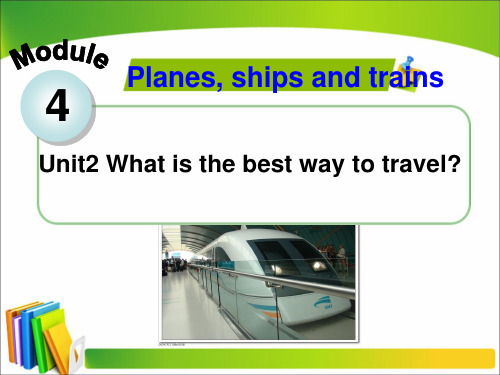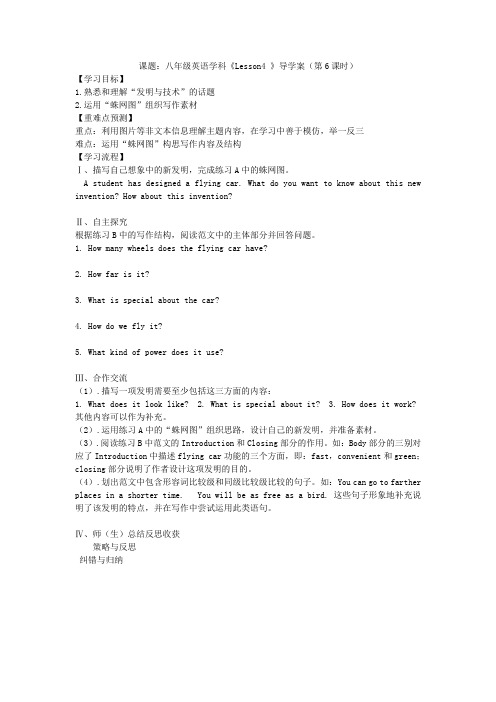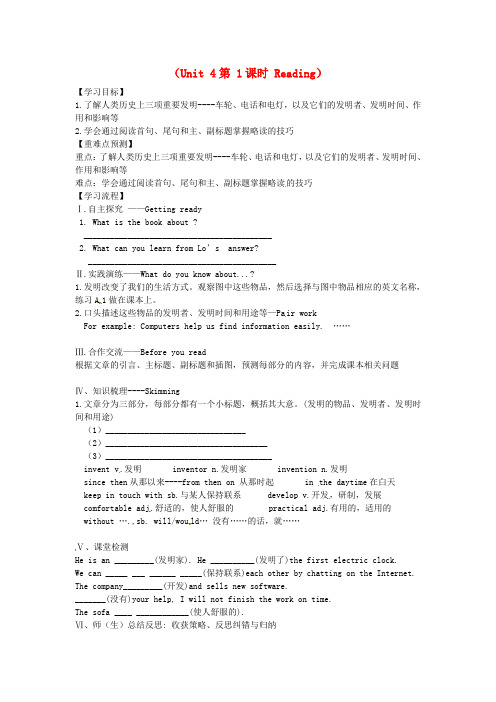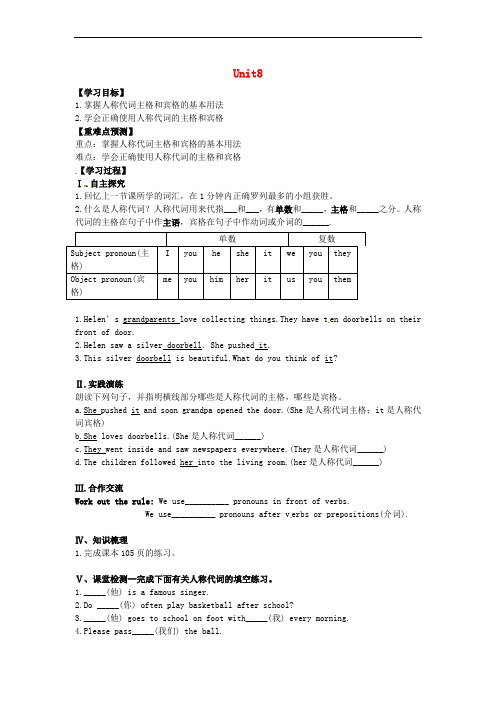广东省广州市南沙区博海学校八年级英语上册《Module 4 School life Unit 7 Memory》(第7课时)导学案
- 格式:doc
- 大小:73.50 KB
- 文档页数:2


课题:八年级英语学科《Lesson4 》导学案(第6课时)【学习目标】1.熟悉和理解“发明与技术”的话题2.运用“蛛网图”组织写作素材【重难点预测】重点:利用图片等非文本信息理解主题内容,在学习中善于模仿,举一反三难点:运用“蛛网图”构思写作内容及结构【学习流程】Ⅰ、描写自己想象中的新发明,完成练习A中的蛛网图。
A student has designed a flying car. What do you want to know about this new invention? How about this invention?Ⅱ、自主探究根据练习B中的写作结构,阅读范文中的主体部分并回答问题。
1. How many wheels does the flying car have?2. How far is it?3. What is special about the car?4. How do we fly it?5. What kind of power does it use?Ⅲ、合作交流(1).描写一项发明需要至少包括这三方面的内容:1. What does it look like?2. What is special about it?3. How does it work? 其他内容可以作为补充。
(2).运用练习A中的“蛛网图”组织思路,设计自己的新发明,并准备素材。
(3).阅读练习B中范文的Introduction和Closing部分的作用。
如:Body部分的三别对应了Introduction中描述flying car功能的三个方面,即:fast,convenient和green;closing部分说明了作者设计这项发明的目的。
(4).划出范文中包含形容词比较级和同级比较级比较的句子。
如:You can go to farther places in a shorter time. You will be as free as a bird. 这些句子形象地补充说明了该发明的特点,并在写作中尝试运用此类语句。

(Unit 4第 1课时 Reading)【学习目标】1.了解人类历史上三项重要发明----车轮、电话和电灯,以及它们的发明者、发明时间、作用和影响等2.学会通过阅读首句、尾句和主、副标题掌握略读的技巧【重难点预测】重点:了解人类历史上三项重要发明----车轮、电话和电灯,以及它们的发明者、发明时间、作用和影响等难点:学会通过阅读首句、尾句和主、副标题掌握略读的技巧【学习流程】Ⅰ.自主探究——Getting ready1. What is the book about ?___________________________________________2. What can you learn from Lo’s answer?___________________________________________Ⅱ.实践演练——What do you know about...?1.发明改变了我们的生活方式。
观察图中这些物品,然后选择与图中物品相应的英文名称,练习A1做在课本上。
2.口头描述这些物品的发明者、发明时间和用途等—Pa ir workFor example: Computers help us find information easily. ……Ⅲ.合作交流——Before you read根据文章的引言、主标题、副标题和插图,预测每部分的内容,并完成课本相关问题Ⅳ、知识梳理----Skimming1.文章分为三部分,每部分都有一个小标题,概括其大意。
(发明的物品、发明者、发明时间和用途)(1)________________________________(2)_____________________________________(3)______________________________________invent v.发明 inventor n.发明家 invention n.发明since then从那以来----from then on 从那时起 in the daytime在白天keep in touch with sb.与某人保持联系 develop v.开发,研制,发展comfortable adj.舒适的,使人舒服的 practical adj.有用的,适用的without ….,sb. will/wou ld…没有……的话,就……Ⅴ、课堂检测He is an _________(发明家). He __________(发明了)the first electric clock.We can _____ ___ ______ _____(保持联系)each other by chatting on the Internet. The company_________(开发)and sells new software._______(没有)your help, I will not finish the work on time.The sofa ____ ____________(使人舒服的).Ⅵ、师(生)总结反思: 收获策略、反思纠错与归纳。


Unit8【学习目标】1.掌握人称代词主格和宾格的基本用法2.学会正确使用人称代词的主格和宾格【重难点预测】重点:掌握人称代词主格和宾格的基本用法难点:学会正确使用人称代词的主格和宾格【学习过程】Ⅰ.自主探究1.回忆上一节课所学的词汇,在1分钟内正确罗列最多的小组获胜。
2.什么是人称代词?人称代词用来代指___和___,有单数和_____,主格和_____之分。
人称代词的主格在句子中作主语,宾格在句子中作动词或介词的______.1.Helen’s grandparents love collecting things.They have t en doorbells on their front of door.2.Helen saw a silver doorbell. She pushed it.3.This silver doorbell is beautiful.What do you think of it?Ⅱ.实践演练朗读下列句子,并指明横线部分哪些是人称代词的主格,哪些是宾格。
a.She pushed it and soon grandpa opened the door.(She是人称代词主格;it是人称代词宾格)b.She loves doorbells.(She是人称代词______)c.They went inside and saw newspapers everywhere.(They是人称代词______)d.The children followed her into the living room.(her是人称代词______)Ⅲ.合作交流Work out the rule: We use__________ pronouns in front of verbs.We use__________ pronouns after v erbs or prepositions(介词).Ⅳ、知识梳理1.完成课本105页的练习。

Module 4 Planes, ships and trains一、学习目标:A. 单词和短语:road, accident, except, far, far away, crowded, choice, classmate, all the time, journey, book, outside, close, park, however, costB. 交际用语:1. What happened?2. Don’t worry.3. —Who lives the closest to school?— Lingling lives closest.4. — What is the most comfortable way to go to school for Betty?— By taxi.5. —What’s the most expensive way to go to school?— Going by taxi is the most expensive.6. How do you get there?7. What’s the cheapest way?8. What’s the best way to get there?9. —What’s the cheapest way to travel from London to Paris?— The cheapest way is by coach.10. It’s the most comfortable way, but it’s the most expensive.11. He lives farthest from school.12. It is the fastest and the second cheapest.13. The more information, the better.C. Skills: 1) Listening and understanding familiar topics (transportation)2) Comparing modes of transportation.3) Reading and finding specific transportation4) Writing a short passage comparing modes of transportation.D. Around the world: The longest railwayE. Task: Making a holiday plan for a family trip to a city in China.二、重点及难点:Superlative adjectives and adverbs (-est, most); irregular superlatives.三、教学设计:Unit 1 He lives the farthest from school.ⅠTeaching modelListening and speakingⅡTeaching methodPWP approachⅢTeaching aims1. Key vocabulary: road, accident, except, far, far away, crowded, choice, classmate,close, all the time2. Key structures:superlative adjectives and adverbs (-est, most); irregularsuperlatives.3. Key sentences:1) What happened?2) Don’t worry.3) — Who lives the closest to school?— Lingling lives closest.4) — What is the most comfortable way to go to school for Betty?— By taxi.5) —What’s the most expensive way to go to school?— Going by taxi is the most expensive.ⅣTeaching aidsTape recorder, OHP, videoⅤTeaching StepsStep 1 Warming-up1. Work in pairs. Show some pictures and ask “How do you often go to school/work?”“How do you often travel?”2. Look and say something about the pictures.Step 2 New wordsUsing pictures or sentences to learn the new words.Step 3 Listening and vocabulary1. Ask the students to read the words in Activity 1.2. Look at the pictures in Activity 1 carefully.3. Now match the words with the pictures.5. Check the answers with the students.Step 4 Look, listen and match.1. Ask the students to read the words in Activity2.2. Play the recording and ask the students to listen to the recording carefully.T: Listen and match the words in the box with the pictures in Activity 1. You need to use one word more than once.3. Check the answers with the students.Step 5 Reading1. Listen and answer the questions.1) How does Lingling go to school? Why?2) How do you think Betty will go to school?2. Ask the students to read the conversation silently.3. Ask the students to read the conversation again and complete the table.3. Check the answers.Step 6 Complete the sentences.1. Ask the students to read the words in the box in Activity 4.2. Read the sentences.1) The _________________ way to go to school is by taxi.2) Tony lives the __________ from school.3) Lingling’s home is the _________ to school, so she always walks.4) For Betty, going to school by bike is the ______ choice.3. Complete the sentences with the correct words from the box.4. Check the answers.Step 7 Language points1. Maybe I should go to school by taxi. 或许我应该坐出租车去上学。
Memory【学习目标】1.能根据上下文语境,猜测memorize,balanced,sharp等单词的意思2.通过补充阅读提高获取关键信息的技能3.养成健康的生活习惯,保持活跃的思维与记忆力【重难点预测】重点:通过补充阅读,了解“总-分-总”的写作结构难点:结合补充阅读内容,梳理和归纳篇章中的细节信息【学习流程】Ⅰ.自主探究1.开展“头脑风暴”,讨论提高记忆力的方法,并将提及到的内容板书出来2.从文章中找出下列单词,进行英汉互译memorize_________ balanced__________ sharp__________习惯_________ 频繁的的,有规律的_________ 外国的________平衡的饮食_____________ 放松________ 谜________Ⅱ.实践演练1.阅读完篇章后,将篇章分成三大部分,并归纳每部分的大意Part 1:___________________________________Part 2:___________________________________Part 3:___________________________________Reading skil ls: skimming(略读/跳读)_____(√) scanning(细读/找读)______(√)Ⅲ.合作交流1.阅读第一段,口头回答问题:What does memory help you do?2.阅读第二、三段,口头回答问题:What are the three ways to exercise your brain?3.阅读第四段,口头回答问题:H o w can you live a healthy life?4.练习A要求同学们依据篇章内容,完成关于“如何提高记忆力”的表格(find out key words)Reading skills: skimming(略读/跳读)_____(√) scanning(细读/找读)______(√)Ⅳ、知识梳理1.练习B要求同学讨论提高记忆力的方法。
Memory【学习目标】1.认读和理解单词note,wallet,basket,manager和短语take out,pour out等2.学会用一般过去时描述过去发生的事情3.能根据关键词,图片等提示,写一则小故事;展开合理想象,为故事添加结尾【重难点预测】重点:能根据关键词,图片等提示,写一则小故事难点:展开合理想象,为故事添加结尾【学习流程】Ⅰ.自主探究先仔细观察六幅图片,并以对话形式讨论每幅图片的内容,了解故事的主人公、发生的地点和大致情节。
Picture 1: 1. H ow many people are there in Picture 1 ?2. Where are they ?3. What does the man want to do ?Picture 2: ......Ⅱ.实践演练※描述自己的记忆时,一般使用一般过去时begin--_______ come--_______ put--______ stop--________ want--_______ 1.练习A要求同学根据四幅图片内容,用选项中动词的适当形式填空,完成故事的前半部分。
Ⅲ.合作交流1.预测故事的结尾:讨论--What will the boy’s father probably do?2.根据五六两幅图片的内容,将这些词汇写成单句。
如:put...into, basket----My dad and I put the money into the basket.give, manager----3.根据关键词,图片等提示,展开合理想象,为故事添加结尾(写成段落)。
小组内互相交流、评析、修改,最后评选出最好的语段,并派代表上台朗读给全班同学听。
Ⅳ、知识梳理写作策略指导:a.开头:交代事件发展的时间、地点、人物等要素。
One day/On a Sunday morning, ...B.中间:按时间顺序或者空间顺序描述事件发展过程。
English week【学习目标】1.了解情态动词should的用法2.学会并掌握should的用法【重难点预测】重点:学会并掌握should的用法难点:正确使用情态动词should【学习流程】Ⅰ、预习检测集体朗读下列主阅读篇章中的句子。
1. In my opinion, every school should have an English Week.2. You should communicate in English with your friends whenever you c an. You should read English books and magazines, and watch English television progr ammes. Above all, you should enjoy English!Ⅱ、自主探究1.阅读P119的对话及例句,完成Work o ut the rule部分的内容。
理解Things to remember 的内容:ought to和should的意义相似。
e.g. You should/ ought to read more English books.2.完成P120的练习,巩固should的用法。
Ⅲ、合作交流学生用should回答下列问题。
1.What should we do if we want to get better marks?______________________________________________________________________________ 2. What should we do if we find a purse on the classroom floor?________________________________________________________________________3. How should we treat our parents when th ey are old?______________________________________________________________________Ⅳ、课堂检测We should get up early.否定形式:__________________________________________________________一般疑问句:____________________________________________________肯定回答:___________________________________________________________否定回答:_________________________________________________________Ⅴ、知识梳理be good at 擅长e.g. Jenny is good at singing.Ⅵ、Homework:1.完成阳光练习册Grammar 部分2.预习P120 B部分的语法Ⅶ、师(生)总结反思: 收获策略、反思纠错与归纳。
English week班别:______________ 姓名:______________ 成绩:_______________(满分:100分)一、听力理解。
(共7小题,每小题1.5分,共10.5分)听下面一段对话,回答第1~2题。
( ) 1. How many cups of coffee has Mike drunk today?A、Three.B、Four.C、Five.( ) 2. What does Jane advise Mike to drink?A、Coffee.B、Tea.C、Milk tea.听下面一段对话,回答第3~4题。
( ) 3. What’s the relationship between the two speakers?A、Husband and wife.B、Mother and son.C、Teacher and student.( ) 4. Why are robots becoming more popular?A、Because they are cheap.B、Because they can do lots of things.C、Because they look like humans.听下面一段独白,回答第5~7题。
( ) 5.Where is the man going?A、America.B、Australia.C、Britain.( ) 6. What’s a B&B hotel?A、It is an expensive hotel.B、It provides bed and breakfast.C、It has sports equipment.( ) 7. Why doesn’t the man like a B&B hotel?A、Because he can’t book a room.B、Because it is very expensive.C、Because he can’t do some sports.二、单项选择题。
Memory
【学习目标】
1.能根据上下文语境,猜测memorize,balanced,sharp等单词的意思
2.通过补充阅读提高获取关键信息的技能
3.养成健康的生活习惯,保持活跃的思维与记忆力
【重难点预测】
重点:通过补充阅读,了解“总-分-总”的写作结构
难点:结合补充阅读内容,梳理和归纳篇章中的细节信息
【学习流程】
Ⅰ.自主探究
1.开展“头脑风暴”,讨论提高记忆力的方法,并将提及到的内容板书出来
2.从文章中找出下列单词,进行英汉互译
memorize_________ balanced__________ sharp__________
习惯_________ 频繁的的,有规律的_________ 外国的________
平衡的饮食_____________ 放松________ 谜________
Ⅱ.实践演练
1.阅读完篇章后,将篇章分成三大部分,并归纳每部分的大意
Part 1:___________________________________
Part 2:___________________________________
Part 3:___________________________________
Reading skil ls: skimming(略读/跳读)_____(√) scanning(细读/找读)______(√)
Ⅲ.合作交流
1.阅读第一段,口头回答问题:What does memory help you do?
2.阅读第二、三段,口头回答问题:What are the three ways to exercise your brain?
3.阅读第四段,口头回答问题:H o w can you live a healthy life?
4.练习A要求同学们依据篇章内容,完成关于“如何提高记忆力”的表格(find out key words)
Reading skills: skimming(略读/跳读)_____(√) scanning(细读/找读)______(√)
Ⅳ、知识梳理
1.练习B要求同学讨论提高记忆力的方法。
完成后,小组内互相评析、修改,最后选派两名代表上台口头汇报讨论的结果。
2.划出重点句型并背诵。
exercise v.训练,锻炼 n.训练,练习 take (some) exercise做运动 do the exercise 做练习
balanced diet平/均衡的饮食 live a+ adj.(happy/poor/rich) +life过着怎样的生活
Ⅴ、课堂检测
1.Your brain gets lots of regular________(训练).
2.She ________(锻炼) two or three times a week.
3.From then on, my parents and I ____ a ______life.(从那时起,我和我的父母过着幸
福的生活。
)
Ⅵ、师(生)总结反思: 收获策略、反思纠错与归纳。